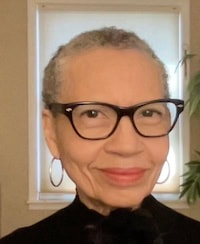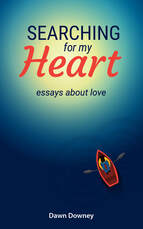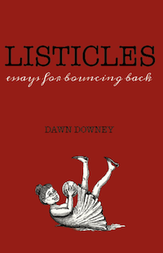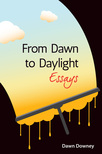...and why I love them.
QUOTES FROM GREAT BOOKS
“Mother spooned the poisoned corn and beans into her mouth … We, her seven children sat around the table watching …” from Change Me into Zeus’s Daughter, by Barbara Robinette Moss. These are the opening lines of Moss’s memoir. The words slammed me down, helpless, into the middle of some unimaginable horror. The poisoning is methodical, ritualistic. Seven kids—who has that many kids? Why are they watching? Why are they calm? The words are packed with existential threat.
“overindulgent cinematic pauses,” from the essay titled “Beyond the Struggle Narrative” in Bad Feminist, by Roxane Gay. In movies from the 1940s, the camera lingered on a woman’s face, a close-up, all soft-focus. Today, the camera lingers on blood and brains oozing from a not-yet-dead man’s skull. I also love this phrase because the words are so perfectly built, one onto the next. One word rolls effortlessly along to the next and the next.
“cherished animosities,” from The Nickel Boys by Colson Whitehead. I’m hanging on to a few resentments myself, and if I stop being mad, it’s like breaking up with a lover. I also admire the rhythm of the phrase. Repeat it out loud, and it’s a vocal exercise or a chant.
“raise a glass to my delusions,” from Voices in the Mirror, by Gordon Parks. A counter-intuitive statement, which is one of my favorite things. It reminds me that delusions are my teachers. The teaching happens when I acknowledge them, when I honor them.
“The headlights jumped to life and lit the surrounding woods as though they were looking for something.” From Blessings, by Anna Quindlen. Not only has Quindlen turned headlights into living creatures, she made them independent of the car. The headlights are predators.
“Winter in Ohio was especially rough if you had an appetite for color.” From Beloved, by Toni Morrison. Toni Morrison made weather personal. I would have just said Ohio winters are gray. Which is why she won the Pulitzer Prize and I haven’t. Yet.
“… self-appointed prophets spouted dogma,” from Lamb: The Gospel According to Biff, Christ's Boyhood Pal, by Christopher Moore. In describing a scene at an ancient marketplace, Moore expresses my unkindest opinions about organized religion. Satire is my secret vice. In private, I laugh at the put-down (insert gay-bashing, racism, misogyny, fat jokes…), but I don’t take public responsibility for agreeing with it.
“I am tired of the whole concept of humans right now." From Network Effect: A Muderbot Novel, by Martha Wells. This sentiment was voiced by a non-human robot construct. When I read it, I snort-laughed and gave it an Amen, because sometimes people get on your last nerve.
“It’s going to take all night and a lot of junk food.” From The Bean Trees, by Barbara Kingsolver. This is philosophical, in a non-lofty way. No matter how bad it might feel right now, the passage of time and the snarfing of junk food will get you through.
QUOTES FROM GREAT BOOKS
“Mother spooned the poisoned corn and beans into her mouth … We, her seven children sat around the table watching …” from Change Me into Zeus’s Daughter, by Barbara Robinette Moss. These are the opening lines of Moss’s memoir. The words slammed me down, helpless, into the middle of some unimaginable horror. The poisoning is methodical, ritualistic. Seven kids—who has that many kids? Why are they watching? Why are they calm? The words are packed with existential threat.
“overindulgent cinematic pauses,” from the essay titled “Beyond the Struggle Narrative” in Bad Feminist, by Roxane Gay. In movies from the 1940s, the camera lingered on a woman’s face, a close-up, all soft-focus. Today, the camera lingers on blood and brains oozing from a not-yet-dead man’s skull. I also love this phrase because the words are so perfectly built, one onto the next. One word rolls effortlessly along to the next and the next.
“cherished animosities,” from The Nickel Boys by Colson Whitehead. I’m hanging on to a few resentments myself, and if I stop being mad, it’s like breaking up with a lover. I also admire the rhythm of the phrase. Repeat it out loud, and it’s a vocal exercise or a chant.
“raise a glass to my delusions,” from Voices in the Mirror, by Gordon Parks. A counter-intuitive statement, which is one of my favorite things. It reminds me that delusions are my teachers. The teaching happens when I acknowledge them, when I honor them.
“The headlights jumped to life and lit the surrounding woods as though they were looking for something.” From Blessings, by Anna Quindlen. Not only has Quindlen turned headlights into living creatures, she made them independent of the car. The headlights are predators.
“Winter in Ohio was especially rough if you had an appetite for color.” From Beloved, by Toni Morrison. Toni Morrison made weather personal. I would have just said Ohio winters are gray. Which is why she won the Pulitzer Prize and I haven’t. Yet.
“… self-appointed prophets spouted dogma,” from Lamb: The Gospel According to Biff, Christ's Boyhood Pal, by Christopher Moore. In describing a scene at an ancient marketplace, Moore expresses my unkindest opinions about organized religion. Satire is my secret vice. In private, I laugh at the put-down (insert gay-bashing, racism, misogyny, fat jokes…), but I don’t take public responsibility for agreeing with it.
“I am tired of the whole concept of humans right now." From Network Effect: A Muderbot Novel, by Martha Wells. This sentiment was voiced by a non-human robot construct. When I read it, I snort-laughed and gave it an Amen, because sometimes people get on your last nerve.
“It’s going to take all night and a lot of junk food.” From The Bean Trees, by Barbara Kingsolver. This is philosophical, in a non-lofty way. No matter how bad it might feel right now, the passage of time and the snarfing of junk food will get you through.







 RSS Feed
RSS Feed